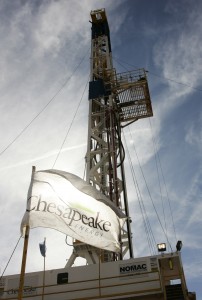Bradford County considers royalties lawsuit against Chesapeake Energy

Bradford County has nearly 1,000 acres leased to Chesapeake and is considering suing the company for allegedly underpaying royalties.
Pennsylvania’s most drilled-on county is exploring the possibility of joining one of the many lawsuits that have been filed recently against Chesapeake Energy. The Oklahoma City-based company has been widely accused of cheating landowners out of royalty money from natural gas drilling.
The Bradford County commissioners asked their solicitor to look into the matter and will make a decision in two weeks. The county has about 1,000 acres leased for gas development and receives royalty payments from Chesapeake. Commissioner Doug McLinko (R) says the county–like many private landowners– feels it’s being underpaid because of the way Chesapeake interprets leases and withholds certain fees.
“What’s going on in this county is just incredible,” he says. “It’s so out of control.”
A Chesapeake spokesman declined to comment for this story.
Although the county’s royalty problems date back to 2012, McLinko says the commissioners had been hoping for a solution from Harrisburg, rather than going to court.
“The state legislatures has got [House Bill 1684] sitting on a shelf with cobwebs and dust,” he says. “They have no desire to help our people.”
He’s referring to a controversial bill that failed to move during the last legislative session. The measure aims to clarify a 1979 state law, which guarantees property owners a minimum one-eighth (12.5 percent) royalty from oil and gas drilling. Many Chesapeake leaseholders complain they are receiving far less. The company has been subpoenaed by the U.S. Department of Justice over the issue and is also under investigation by state Attorney General Kathleen Kane.
The prime sponsor of H.B. 1684, Rep. Garth Everett (R- Lycoming) plans to re-introduce the bill before the end of June.
“It is substantially different,” Everett says of his new draft. “It doesn’t get into trying to define which deductions can and can’t be taken.”
For example, he says if a landowner negotiated a lease with a company for a higher percentage of the royalties, like 18 percent, his bill is silent on whether the driller can withhold fees and lower that amount to 12.5 percent. But the measure would not allow gas companies to go below that threshold.
“The bill says one-eighth is one-eighth,” he says. “It is very narrowly focused on the issue of the minimum royalty.”
Last time around, gas industry groups lobbied heavily against the bill, arguing it was unconstitutional because it could change the terms of existing contracts. Everett says he knows drillers would prefer he drop the matter entirely, but he’s hopeful the opposition is softening.
“I have showed drafts of it to folks in the industry, and they have helped me tighten up some of the language– even if they don’t like it,” he says.
Jackie Root heads the Pennsylvania chapter of the National Association of Royalty Owners. Her group has been pushing hard for the legislation. She points out some state agencies have also raised questions about the accuracy of their royalty payments from drilling on state land.
“This remains the number one issue for royalty owners in Pennsylvania,” says Root. “This not only affects private citizens– it’s local government, the Game Commission, [the Department of Conservation and Natural Resources]. It’s happening across the board.”
In January the state senate unanimously passed two other bills aimed at protecting royalty owners. One would allow them to audit companies’ records. Another would bar drillers from retaliating against people who question payments. Neither measure has been taken up by the House. Royalty issues have not come up recently, according to House Speaker Mike Turzai (R- Allegheny).
“There’s not been any discussion on that front,” he said at a recent press conference.
















